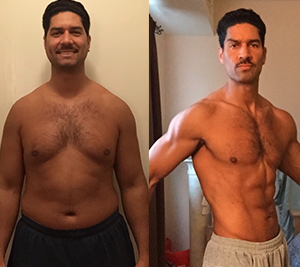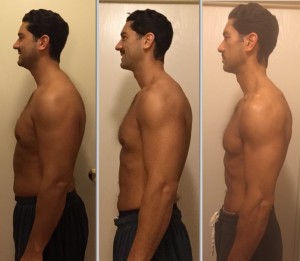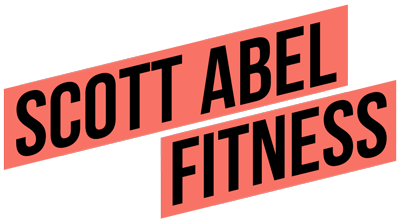 In Part 1 of my coverage of my client JP’s incredible and inspirational transformation I discussed JP’s mindset from the time he first joined as a Coaching client, and how it was decisively more important than the individual program or diet-strategy we put in place for him.
In Part 1 of my coverage of my client JP’s incredible and inspirational transformation I discussed JP’s mindset from the time he first joined as a Coaching client, and how it was decisively more important than the individual program or diet-strategy we put in place for him.
We also heard from JP himself, and you saw the changes how his mindset wentfrom believing in the power of his excuses to believing in the power and strength of taking control of things himself.
I have been around this game long enough now to tell you that the mind is everything! Want to transform your body? Get your mind right first. This is the most understated value of one on one Coaching. I get so many clients who join with me and they “say” they are in it for the long haul… but then they are gone 2-3 months later. These types of people are likely to never get to their envisioned promised-land of transformation, because they never truly work on the obstacles in their own mindsets. The keep looking “externally” and discount the power of looking internally with help and guidance.
As I said in my book “The Psychology of Achievement” the evidence is clear and the truth in reality is this: training, practice, and consistency are not what you do after you get to where you want to be. These are the things that get you to where you want to be.
Whether you are trying to earn your degree, act on a stage, run a business,write a book, or whatever, if something extraordinary is your expected result, then something extraordinary must be put in.
I’m not talking about working harder and exhausting yourself. I’m talking about being “consistent without excuses.”
Massing many hours and weeks of consistency make you good. Doing so with the right attitude and the right mindset makes you excellent and takes you to your goal, and lets you build on it.
Look at JP’s incredible transformation pictures again:


That is the outer result of the inner work!
If you read Part 1, you see that JP discusses “consistency without excuses” much more than he does the diet or training regimen I put him on. Yes, those things are integral. But had he continued listing all the reasons why he had failed in the past, then he would have continued to fail.
The value of Coaching here is that you have a third party who can consistently challenge your previous way of thinking–that is, the thinking that itself creates the obstacles that seem so real. Without that ongoing Coaching interaction to challenge “stinkin thinkin” most people fall into old patterns and go back to seeking magic solutions to physique transformation. But as I said in Part 1, when you look at JP’s initial assessment info and his REAL-LIFE issues, a diet and training program from me or from anyone else wouldn't have solved the issues perceived previously by him as “obstacles” to his success.
What we did is changed his mindset, in order to perceive these things as “challenges” to his success, not excuses for his lack of success.
In general, people want to believe in magic. They want to believe in talent or genetics, and down play hard work and work ethic. They would prefer to think that inborn talent or some magic recipe they just don’t know about yet is the key to someone else’s achievement. But effort is crucial. Check that: consistent, and compliant effort is crucial.
You can’t want the goal but hate the process that gets you there.
Effort requires showing up, not just when you feel like it, but ESPECIALLY when you don’t.
Effort requires the right attitude.
Effort requires taking risks; it requires risking failure, and maybe even repeated failure.
Effort requires that you first make the investment in YOURSELF, and then in the process; your investment in the process is just a reflection of a new investment in yourself.
That is the mental connection that JP made that allowed him to soar toward his amazing accomplishment. If you have trouble investing in yourself, then you get help. You talk to a Coach. JP made that connection as well. He got tired of program-hopping and diet-shopping on the internet, and he realized the answers for him went beyond that.
Furthermore, effort requires believing that effort itself always pays off.
You stop looking for that end result or “progress” with your notion of what progress is. You accept that you need to show up, not just for the parts you like to do, but for all the parts of the process required of you. It’s not just about “working the plan.” It’s also about “how” you work the plan and how consistently you do it. As I said in Part 1, “I can only plan the work for the client; it’s up to the client to work the plan!”
The main reason so many people do not achieve the accomplishment they aim for is because of the constant bickering in their own minds over why it can’t be done. Worst of all are those of you who think the answer is always somewhere else, in some “thing” or “recipe” you aren’t doing, or if you think it’s just “not the right time,” and a whole host of other mental blocks I’ve heard over the years.
All this mental noise does is excuse you for not being consistent enough and committing yourself completely to what is required for YOU to reach your goal.
Mental masturbation like this makes quitters, not achievers. You can always find a dozen reasons why you can’t follow what you need to do today to reach your goal down the road. There will always be at least one good reason to get it done anyway. The difference between those who accomplish the goal and those who do not, is about whether you commit to that one good reason to stay consistent and follow through. Then the real achievers wake up tomorrow and do it again. This is another “mindset of achievement” connection that JP has internalized and works for his own sake.
Another way of looking at all of this and at JP’s incredible transformation is this: “A winner is a really a former loser who has unbiasedly evaluated himself, and opted for change.”
JP opted to finally understand he had to “change his mind in order to change his body.” And he wasn't doing that effectively on his own, so he hired a Coach. That decision was part of his decision to change, his decision to look at himself unbiasedly and do what needed to be done to succeed.
A mistake many people in that same moment is to surround themselves with people who make them feel good rather than people who will tell them what they actually need to hear to improve and be better. Remember, it’s not that “misery loves company” but that “misery loves miserable company.” If you really want to improve yourself and you use some personal goal like physique transformation as a lens for that, then you must select someone you respect who you know will tell you the truth, and tell you what you need to hear… which is not always what you may want to hear. This is where a worthy Coach comes in. This is someone who can deliver honest, real, truthful feedback to you in a supportive and diplomatic way. Think coaching and “honest” feedback like getting into a very hot bath. It can seem “scalding” at first, but then you settle into it, and you get used to it. Then you feel soothed by it, then you can enjoy it – and eventually you start to thrive on it!
Some of the other grander lessons JP’s transformation teaches is that the greatest payback often comes when you want to give up, but you keep going anyway. This wasn’t JP’s first attempt at weight-loss before coming to me. But just because he didn’t succeed before, it didn’t stop him from soliciting help to try it again. He didn't try just another diet, however. That would be spinning his wheels, more of the same. Part of the his unbiased decision to change included actually making a real change. What he was doing wasn't working. So he opted for something that would work.
JP’s transformation teaches that “consistency is the mother of all achievement, and the father of real improvement.” This “improvement” is available for anyone! But you have to look for it in the right places. It's not in magic diets, or vogue trends, but in individualized, interactive support and guidance.
The final thing I would like to leave you with regarding JP’s transformation is this: If the goal is truly that important to you then you will never have to worry about self-discipline and perseverance. They will eventually come naturally to you and be there when you need them. But you have to first build some momentum toward them and meet them half-way. It’s people with lofty goals but lacking grit who have to worry about the constant absence of things like self-discipline and perseverance. The constant absence of these things that will prevent you from attaining your goal. It’s not the absence of the “right” diet or the “right” program as so many people would like to delude themselves into believing.
Once again, I’d like to congratulate my client JP on his incredible and inspiring transformation and thank him for letting us share his story as a “teaching moment” about what it takes to succeed, and the value of honest, real Coaching.
